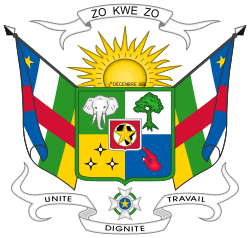Civic Forum (Central African Republic)
Civic Forum (French: Forum Civique, FC) was a political party in the Central African Republic led by Timothée Malendoma.[1]
Civic Forum | |
|---|---|
| President | Timothée Malendoma |
| Founded | 1991 |
| Headquarters | Bangui |
| Ideology | Conservatism Republicanism Federalism |
| |
 |
|---|
| This article is part of a series on the politics and government of the Central African Republic |
|
|
Administrative divisions |
|
|
|
|
History
Established in 1991,[2] the party was originally a member of the Concentration of Democratic Forces alliance, but was suspended in August 1992 due to its participation in the "grand national debate". On 4 December 1992 its leader Malendoma was appointed Prime Minister, but he was later sacked by President André Kolingba on 26 February 1993.[3]
In the 1993 general elections the party nominated Malendoma as its candidate for the presidency. Malendoma finished sixth out of eight candidates in the first round with 2% of the vote. In the National Assembly elections the party won a single seat.[4]
In the next parliamentary elections in 1998 the Civic Forum was part of the Union of Forces for Peace (UFAP), which opposed President Ange-Félix Patassé. The party won a single seat, and UFAP gained a majority of 55 of the 109 seats in the National Assembly. However, the ruling Movement for the Liberation of the Central African People was able to form a government after the defection of a UFAP MP.[5]
References
- David Seddon (2013) A Political and Economic Dictionary of Africa, Routledge, p151
- CAR: Parties inactive in the 2011 elections EISA
- Arthur Banks, Thomas C Muller, William R Overstreet & Judith F Isacoff (2009) Political Handbook of the World 2009, CQ Press, p235
- Elections in the Central African Republic African Elections Database
- Tom Lansford (2014) Political Handbook of the World 2014, CQ Press, p249